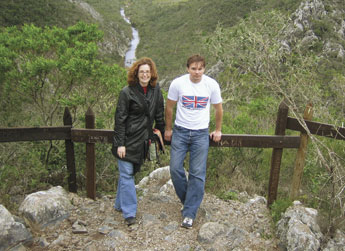
| Summer 2005, No. 21 |
|
ContentsSociology Professor Larry Fask Says Farewell Barbara Charnock Elected Treasurer of MACC Board The Janampatrika and the Perfect Marriage Partner College Employees Visit Uruguay Health and Exercise Science Program Begins this Fall Student Profile: PJ Ward Brown
|
| College Employees Visit Uruguay as Part of Rotary Study Exchange |
||
|
Carroll Community College employees Rebecca Maurio and Stephen Pipes have always loved Hispanic culture, and have always jumped at the chance to practice their Spanish. Imagine their feeling of good fortune when they learned that the Rotary International Foundation had selected them to participate in a four-week exchange program in Uruguay this spring. Maurio and Pipes are both members of Carroll’s Continuing Education and Training staff. The Group Study Exchange provides young professionals with the opportunity to experience their profession, as well as life, in another country. Maurio and Pipes both welcomed the chance to introduce the community college concept to people they met while touring cities and small, remote towns. In Uruguay, there are no community colleges. Instead, four-year public universities are free. While in Uruguay, the group visited many educational institutions—from private universities and language centers in the capital city of Montevideo, to small rural schools. Maurio, Carroll’s English for Speakers of Other Languages (ESOL) coordinator, visited English classes and shared information with both teachers and students. She also met many people with family and friends who left Uruguay in search of work, following an economic crisis in 2001. “Meeting and getting to know people who are left behind, as their loved ones seek better opportunities, gives me a better understanding of our ESOL students and their family situations,” said Maurio. Another component of the exchange includes living with host families. “Living with locals gave us a feel for the customs and traditions in the country. It also allowed us to build friendships and dispel some myths that exist in each of our countries about one another,” said Maurio. The group lived with families in six different cities in Uruguay, allowing them to see both cosmopolitan areas and smaller towns. “In each town, our hosts were anxious to show us their history, culture and customs. We visited local museums and parks, as well as factories, food processing plants, and dairy farms. Our group also had the opportunity to visit some of the beach towns of Uruguay, as well as horse farms and nature preserves. The amount of things we saw makes it seem like we were gone for four months, not four weeks!” said Maurio. “One of the things I loved the most was the warm reception from the people,” said Maurio. “There were greeters at each bus station. The people showed feelings of excitement and expectation.” Pipes echoed Maurio’s observations of the people, culture and geography in Uruguay. He said he also found it helpful to learn about the work people do there. “During my time in Uruguay, I had the opportunity to see what others with jobs similar to mine were doing. Most of the technology used was up-to-date,” he said. Pipes continued that the standard of living in Uruguay seems comparable to that of many areas in the United States. “Among many Americans, there is a belief that countries in South America are far less fortunate than our own. This is not completely true. Nothing is “third world” about Uruguay. It is a very beautiful country with standards up to our own. I never felt threatened or in danger in any city in Uruguay. And yes, I was able to drink the water,” he said. “On a personal level, I feel privileged to have had the opportunity to show the Uruguayan people what North Americans (as they call us) are really like. Many of the people I met in the countryside never met anyone from the U.S. Their only impression of the U.S. was from Hollywood or from images they see on TV. In fact every person I came in contact with was friendly to me, from the taxi driver giving me a ride, to the families I had the good fortune of boarding with,” said Pipes. The Group Study Exchange is an annual program funded by the Rotary International Foundation. A five-member Uruguayan team also visited the United States, during a month-long visit. The two groups met for a weekend at the annual Rotary District Convention in Hershey, Pa.
Maurio and Pipes hike in Quebrada de los Cuervos, outside of the town Treinta Y Tres.
The Group Study Exchange visits students and their teacher at a rural school in Pando. |
||

